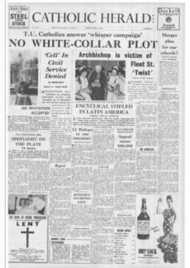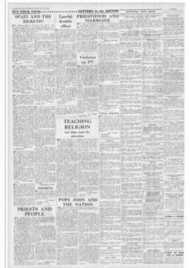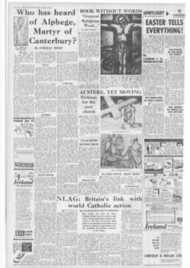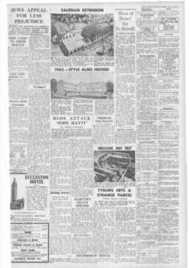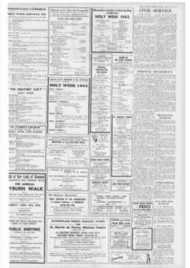Page 7, 13th April 1962
Page 7

Report an error
Noticed an error on this page?If you've noticed an error in this article please click here to report it.
Tags
Share
Related articles
Pope Will Make Changes In Curia
The Life 0 The Pope
"the Pope Is A Jew" Says Nazi Paper
Counti Ratti
Co-operation With Socialists
REDS ATTACK 'POPE RATTI
By a Special Correspondent TWENTY-FIVE years after the publication of Pope Pius XEs encyclical, Divini Redenytoris, the Italian Communist party daily Unita has launched a bitter attack on "Pope Ratti" (his family name), accusing him of having proclaimed an "anti-Communist crusade on the plane of concrete political action."
"No one can ignore," writes I.ibera Pierantozzi in a recent issue, that it was precisely the premises of anti-Communism that led to Fascism in Italy, to Nazism in Germany and to all the other Fascist type movements which plunged the world into ruin . . . In reality, Divini Redemptnris marked the most advanced moment of the convergence between Fascism and the reactionary ideas of Pius XI."
This thumb-nail portrait of a Pope has the merit of simplicity; but its bold outlines owe more to propaganda than to historical fact.
In the first place, the Unita article does not mention that Pius XI's encyclical on Communism was preceded by others criticising both Fascisms and Naeism. The one on Fascism, No Abbionro Bisogno, appeared on June 29, 1931, and that on the Nazi regime, Mit Brennender Sorge, on March 14, I937-five days before the publication of Divini Redempioris.
In both of those earlier encyclicala Pius XI made clear his
opposition to the doctrines of the
totalitarian state and of racial national ism.
The Unita article does mention the encyclical on "The situation of the Church in the German Reich," but only to ridicule the idea that the Churoh was waging "a battle on two fronts"-against Nazi totalitarianism as well as against Communism. It is true that this encyclical was primarily concerned with Nazi breaches of the 1933 Concordat, but it contained an unequivocal condemnation of the "pernicious errors (and) even more pernicious practices" of Nazism and of those who promote the "idolatrous cult" of "the race, the people, the State, the form of the State, or the persons who hold power."
The Nazis themselves had no doubt that this was an attack on their regime. They forbade the bringing of the encyclical into Germany-in spite of which it was read from all Catholic pulpits simultaneously, one Sunday in 1937.
It is hard to see how the Unita writer can justify his description of Divini Redemptoris as a call for "an anti-Communist crusade on the plane of concrete political action." The encyclical contains no such appeal. There is no mention of any "concrete political action." In fact, more than half of it consists of a discourse on Christian social principles, emphasising those ideals of social justice which Pius XI had already expounded in the encyclical Quadragesinto .4 nines.
For the rest, it is an attack on Communist doctrines and practice, condemning its militant atheism, its use of terrorism under Stalin as an instrument of policy, and its neglect of the individual.
blog comments powered by Disqus


